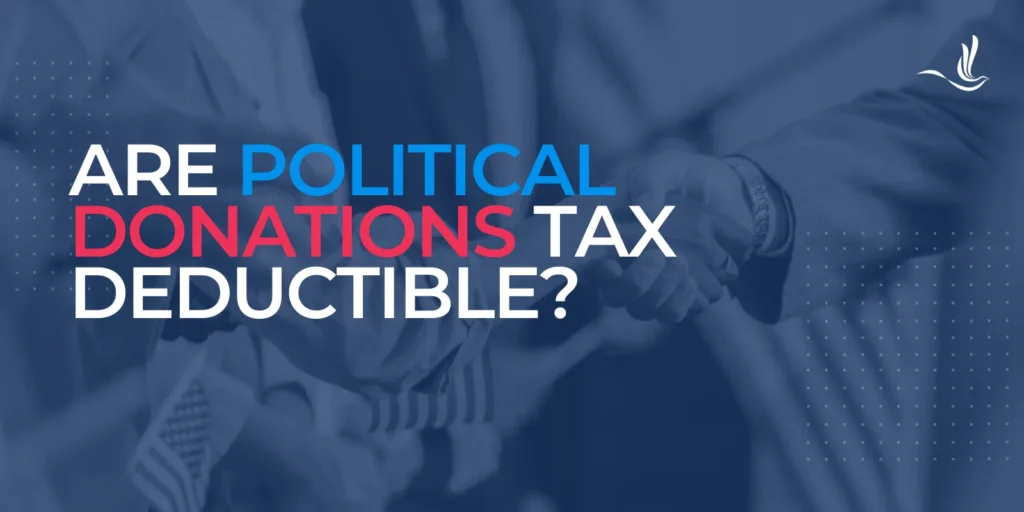Political donations are a vital part of democratic systems, empowering individuals to support their preferred candidates, parties, and causes. As Election Day approaches, people often wonder whether their contributions to political campaigns, committees, or candidates can be deducted on their tax returns. This question arises frequently, especially in the context of other charitable donations, which are typically deductible. To clear up this common confusion, let’s explore the specifics of political contributions and their tax implications.
The Tax Code’s Approach to Political Contributions
The short answer to whether political donations are tax-deductible is no. Under U.S. tax law, contributions made to political candidates, parties, or action committees do not qualify as tax-deductible expenses. The IRS explicitly prohibits deducting any amount paid for direct or indirect support of political entities. This rule applies to individuals, partnerships, and corporations alike.
Why Aren’t Political Donations Tax-Deductible?
The main reason political contributions are not tax-deductible lies in maintaining a clear separation between charitable giving and political influence. The IRS recognizes organizations under Section 501(c)(3) of the Internal Revenue Code as charitable or non-profit organizations eligible for tax-deductible contributions. In contrast, political entities are classified differently, often under Section 527, which covers political organizations. By not granting deductions for political contributions, the IRS aims to prevent misuse of tax benefits for political gain and ensure equitable tax treatment regardless of political preference.
What Types of Contributions Are Not Deductible?
When discussing political donations, it’s essential to know the types of contributions that fall outside the deductible category. According to IRS rules, non-deductible political donations include the following.
- Contributions to Political Candidates: Donations to support candidates running for local, state, or federal office are not deductible. This includes campaign contributions or personal gifts to candidates to support their election efforts.
- Political Party Contributions: Any donations made to national, state, or local political parties are also not deductible. This restriction extends to monthly membership dues or one-time contributions.
- Gifts to Political Action Committees (PACs) and Super PACs: Donations to PACs and Super PACs, which advocate for political candidates or causes, cannot be claimed as a tax deduction.
- Gifts to Political Advocacy Groups: Contributions to organizations that primarily engage in political lobbying, issue advocacy, or election-related activities are not deductible.
The IRS even extends this non-deductibility rule to donations indirectly supporting political entities, including items like tickets to political fundraising dinners or events. Essentially, if your financial contribution is intended to influence an election, it will not be eligible for a deduction.
Exceptions and Misconceptions
One area that often confuses donors is the difference between political donations and contributions to social welfare organizations. Social welfare organizations organized under Section 501(c)(4) can engage in limited political activity but are not primarily political entities. Donations to these groups are still not deductible as charitable contributions but may be considered a business expense if certain requirements are met. However, these expenses are not related to directly supporting a political candidate or party. A business can deduct the cost of attending seminars or events that cover issues relevant to their industry, but any payment specifically labeled as a contribution or gift for political purposes remains non-deductible.
The Broader Implications
The non-deductibility of political donations has broader implications for the way individuals and corporations support political activities. While it may seem like a deterrent to contributing, this tax code rule ensures that the government does not indirectly subsidize political campaigns. Allowing deductions for political contributions could create imbalances in political influence, where wealthier individuals or corporations could secure greater tax benefits and exert a disproportionate impact on elections.
Additionally, there are alternative ways to support political advocacy that are tax-deductible. For example, donations to educational or charitable organizations that promote civic education or non-partisan political research may qualify for tax deductions if the organization is a 501(c)(3) entity. However, the activities of these organizations must remain within the IRS guidelines that prohibit direct political campaigning or lobbying.
Practical Implications for Donors
So, what does this mean for donors? If you contribute to a political campaign, PAC, or advocacy group, plan on that money coming directly from your after-tax income. It’s wise to track your political donations separately from your charitable giving to avoid potential confusion at tax time. If you use software for tax filing, double-check that your political contributions are not inadvertently entered as deductible expenses.
Need Tax Help? Call Optima Tax Relief
In summary, political donations are not tax-deductible under current IRS regulations. This distinction stems from the desire to prevent political favoritism and preserve fairness in the tax code. If you’re looking to claim deductions on your tax return, remember that only donations to qualified charitable organizations can help reduce your taxable income. Before making significant political contributions, ensure you understand the tax implications and keep your financial records organized. If you’re unsure whether an expense is tax-deductible, seek advice from a qualified tax professional. They can help you distinguish between charitable contributions, political donations, and other expenses. Optima Tax Relief is the nation’s leading tax resolution firm with over a decade of experience helping taxpayers with tough tax situations.
If You Need Tax Help, Contact Us Today for a Free Consultation
Publisher: Source link











